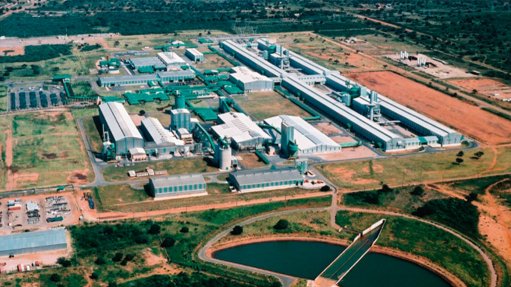When the taps run dry: How provincial water disparities are forcing SA farmers to go independent
This article has been supplied.
The story of South African agriculture in 2025 is increasingly becoming one of self-reliance, driven by a stark reality that national statistics fail to capture. While government reports trumpet a reassuring 94.2% national dam capacity (1), the truth on the ground tells a dramatically different story - one where thriving farms in the Free State exist alongside desperate agricultural communities in the Eastern Cape. This is the new South Africa: a country where your postal code determines your access to the most fundamental resource for agricultural survival.
The great water divide: When national averages mask local disasters
The numbers paint a troubling picture of provincial inequality that threatens the very foundation of South African food security. While the Eastern Cape's Algoa Water Supply System struggles at just 82.3% capacity with individual dams like Impofu at a concerning 58.5%, other provinces sit comfortably above 100% capacity (1,2). The Free State, for instance, maintains dam levels above 101%, creating a stark contrast that highlights the uneven distribution of water resources across the country.
The Eastern Cape has experienced a devastating 12-percentage point decline in water access since 2012, leaving only 67.2% of households with reliable water supply (3). For agricultural businesses in these regions, this disparity isn't just a statistic - it's an existential threat that makes traditional farming models unsustainable.
Nationally, approximately 37% of water is lost due to leaking pipes and other infrastructure failures, while around 64% of households have safe, reliable access to water (5). The recent Blue Drop Audit report revealed that 46% of water supply systems are contaminated, with over two-thirds of wastewater treatment plants close to failure (4).
The implications for agriculture are staggering. Eastern Cape agricultural communities now rely on rivers and unreliable tankers, while two-thirds of Northern Cape's game population has been lost to drought conditions (3). These provincial disparities mask a true water security crisis that directly threatens food production capacity.
Beyond government solutions: The case for agricultural independence
For forward-thinking agricultural businesses, the lesson is clear: waiting for provincial infrastructure upgrades is a luxury they cannot afford. Major projects like the R8 billion Ntabelanga Dam and R2 billion Foxwood Dam are underway but years from completion (3), leaving current agricultural operations vulnerable to ongoing water insecurity.
This is where innovative water storage solutions become not just helpful additions to farm infrastructure, but essential survival tools. Modern agricultural enterprises are discovering that independent water storage systems offer something that municipal infrastructure simply cannot: predictable, controllable water security with guaranteed performance.
The DamPro solution: Engineering independence from infrastructure failures
DamPro's comprehensive water storage solutions represent a fundamental shift in how South African farmers approach water security. Rather than remaining dependent on failing provincial systems, agricultural businesses can create resilient, independent water storage that operates regardless of municipal performance.
SuperDam: Built for the long term
The SuperDam offers agricultural businesses up to 16 years of guaranteed water storage capacity, constructed from high-quality Aluzinc or galvanised steel with the specialised Flexi Liner designed to withstand South Africa's harsh conditions. Unlike temporary measures or government promises, this represents a tangible, long-term investment in agricultural continuity. The engineering speaks for itself: corrugated reservoirs survive in even the harshest conditions, with guaranteed liners containing UV stabilisers ensuring durability despite prolonged sun exposure. For farms in regions experiencing infrastructure decline, this level of guaranteed performance provides the security that municipal systems simply cannot match.
Damsak® WaterBladders: Flexible response to changing conditions
Perhaps most importantly for agricultural planning, Damsak® water bladders offer scalable storage from 500 litres to 500,000 litres, providing flexibility that allows farms to adapt storage capacity to seasonal demands and changing conditions. These polyester-reinforced PVC reservoirs have been manufactured since 2007, with the very first units still operational and in excellent condition. The closed system design addresses multiple agricultural challenges that comes with a 10 year guarantee: water remains free from algae growth, there's no evaporation or contamination, and the dark environment ensures water stays clean and fresh. For regions where water quality is as uncertain as availability, this controlled environment becomes essential for agricultural operations.
The Economics of water independence
The financial case for independent water storage becomes compelling when viewed against the backdrop of agricultural losses from water insecurity. Cape Town's water crisis demonstrated the devastating economic impact of water dependency, with agricultural productivity dropping significantly during drought periods (8).
South Africa is approaching physical water scarcity in 2025, with projections of a 17% water deficit by 2030 (6). For agricultural businesses, this projection represents more than environmental concern - it's a business continuity crisis that demands proactive solutions.
DamPro's solutions offer guaranteed performance timelines that allow for precise agricultural planning (9,10,11). With guarantee options of 10, 12, 14, or 16 years, farmers can calculate long-term water security costs and plan accordingly, something impossible with unpredictable municipal infrastructure.
Strategic Implementation for agricultural resilience
The most successful agricultural businesses are already implementing multi-layered water security strategies that combine different storage solutions based on specific operational needs. This might include:
- SuperDam installations for primary water storage with long-term guarantees.
- Damsak® bladders for emergency reserves and temporary storage during infrastructure maintenance.
- DAMFIX sealants offers treatments for new or existing soil-based dams. You can seal a brand-new dam with less product than traditional sealing methods. Rehabilitation of existing dams is much easier, by preserving valuable water resources and extending the life of current water infrastructure.
DAMFIX Dry is an essential sealing method for new earth dams. The product comprise of super-absorbent polymers and minerals that is tilled into the soil bed and then compacted. It allows for a shorter settlement period other than the normally expected 2 to 3 years.
DAMFIX Wet represents a particularly important option for farms with existing earth dams, offering a super-absorbent polymer solution that seals leaks while water remains in the dam, preserving valuable water resources without requiring drainage (12).
The future of agricultural water security
Provincial differences in water access reveal that delivery disparities continue to affect agricultural regions differently, with predominantly rural provinces still lagging behind in infrastructure development (3,15). For agricultural businesses, this reality demands a fundamental shift from dependency on improving infrastructure to investment in independent, controllable water systems.
The most resilient agricultural operations of the next decade will be those that recognise water security as a core infrastructure investment, not an operational expense. DamPro's solutions provide the engineering foundation for this transition, offering enhanced performance that allows agricultural businesses to plan, invest, and grow regardless of provincial water management performance. DamPro's approach focuses on conducting focused assessments for each unique situation, whether dealing with leaking dams or the need to increase water storage capacity.
The taps may run dry in your province, but your farm doesn't have to.
DamPro specializes in comprehensive water storage solutions for South African agriculture. From leak repair to complete storage systems, their solutions provide amazing performance that keeps agricultural operations running regardless of provincial infrastructure challenges. Contact DamPro to assess your farm's water security needs and discover how independent storage systems can protect your agricultural investment.
Article Enquiry
Email Article
Save Article
Feedback
To advertise email advertising@creamermedia.co.za or click here
Press Office
Announcements
What's On
Subscribe to improve your user experience...
Option 1 (equivalent of R125 a month):
Receive a weekly copy of Creamer Media's Engineering News & Mining Weekly magazine
(print copy for those in South Africa and e-magazine for those outside of South Africa)
Receive daily email newsletters
Access to full search results
Access archive of magazine back copies
Access to Projects in Progress
Access to ONE Research Report of your choice in PDF format
Option 2 (equivalent of R375 a month):
All benefits from Option 1
PLUS
Access to Creamer Media's Research Channel Africa for ALL Research Reports, in PDF format, on various industrial and mining sectors
including Electricity; Water; Energy Transition; Hydrogen; Roads, Rail and Ports; Coal; Gold; Platinum; Battery Metals; etc.
Already a subscriber?
Forgotten your password?
Receive weekly copy of Creamer Media's Engineering News & Mining Weekly magazine (print copy for those in South Africa and e-magazine for those outside of South Africa)
➕
Recieve daily email newsletters
➕
Access to full search results
➕
Access archive of magazine back copies
➕
Access to Projects in Progress
➕
Access to ONE Research Report of your choice in PDF format
RESEARCH CHANNEL AFRICA
R4500 (equivalent of R375 a month)
SUBSCRIBEAll benefits from Option 1
➕
Access to Creamer Media's Research Channel Africa for ALL Research Reports on various industrial and mining sectors, in PDF format, including on:
Electricity
➕
Water
➕
Energy Transition
➕
Hydrogen
➕
Roads, Rail and Ports
➕
Coal
➕
Gold
➕
Platinum
➕
Battery Metals
➕
etc.
Receive all benefits from Option 1 or Option 2 delivered to numerous people at your company
➕
Multiple User names and Passwords for simultaneous log-ins
➕
Intranet integration access to all in your organisation


















